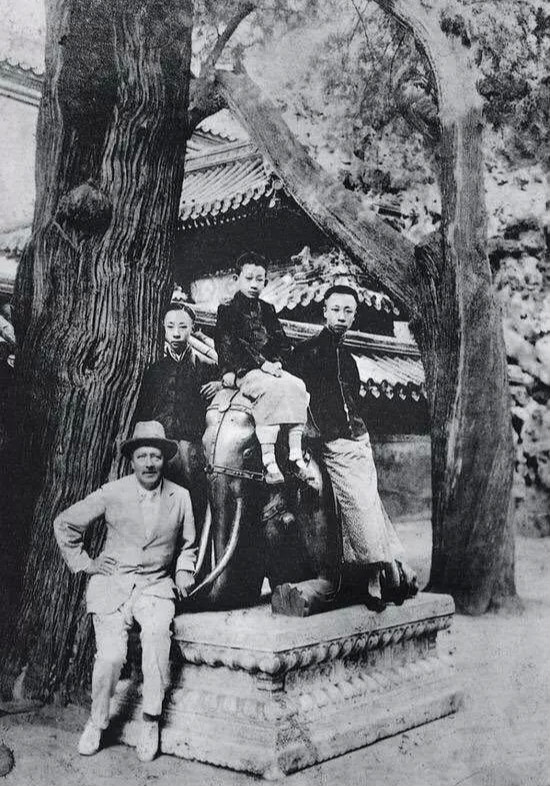Track One
He is credited with teaching the Last Emperor, Pu Yi, to cycle
他被歸功于教會(huì)了末代皇帝溥儀騎自行車
In the Forbidden city there are these areas with ramps, not steps
紫禁城中有很多斜坡,并沒有被修葺成臺(tái)階
The story is that this was for the little boy to cycle
故事里說,斜坡的存在就是為了讓這小男孩學(xué)習(xí)騎自行車
It might be true—I have seen no writing of this
這也許是真的—我到是沒有看過任何關(guān)于這些故事的文字資料
He did not only give a bicycle to the Emperor—he gave bicycles to both the Emperor and the Empress
他不僅給了皇帝一輛自行車,也給了皇后一輛
It is not exactly accurate in the movie ('The Last Emperor) that he was so small when he has the bicycle—because he was actually married at 16 years old
電影“末代皇帝”中的橋段并不十分精確,里面說皇帝在很小的時(shí)候就有了一輛自行車,事實(shí)上溥儀皇帝那時(shí)已經(jīng)年滿16歲并且已經(jīng)結(jié)婚了。
So it was actually later than the image we get from the movie
所以皇帝擁有自行車的實(shí)際年齡比我們從電影中看到的大得多
Did Reginald Johnston actually introduce the bicycle to China
那么莊士敦到底是不是把自行車引進(jìn)中國的那個(gè)人呢
He didn't—not at all
他不是,完全不是
Actually the emperor before, GuangXu—he had also a bicycle much, much earlier
事實(shí)上,溥儀的先帝,光緒皇帝早就擁有自行車
The whole story of the bicycle is quite amazing—I do think it was invented in the UK
關(guān)于自行車的起源也是令人嘆為觀止的,我確實(shí)認(rèn)為自行車是英國人發(fā)明的
I think that is very likely—a lot of the bicycles that were used at first in China came from the UK
我認(rèn)為這是很有可能的——中國最開始使用那一批自行車確實(shí)來自英國
it was later there was a big home production of bicycles
后來,還有了一個(gè)自行車的大型生產(chǎn)基地
Another story that can definitely be confirmed is the story of Pu Yi's glasses
另外一個(gè)確鑿的故事,就是溥儀的洋眼鏡
When Reginald Johnston is coming into the Forbidden City he realises that the Last Emperor has a very heavy short-sight
當(dāng)莊士敦進(jìn)入紫禁城后,他發(fā)現(xiàn)這位皇帝竟然是個(gè)高度近視
The Last Emperor is suffering from very severe headaches because of this
這位末代皇帝也因此遭受嚴(yán)重的頭疼困擾
But the administration around him, they wont allow him to have glasses
because they think it is a very modern, western thing
但是皇帝身邊的總管們卻不允許他戴眼鏡,因?yàn)樗麄冋J(rèn)為眼鏡是個(gè)現(xiàn)代的、西方的玩意
Fascinating—at this point you have the Forbidden City
相當(dāng)有趣——此刻你擁有整個(gè)紫禁城
The southern part belongs to the Republic
南邊部分屬于共和國
Many architects were coming in and changing it—there was the first Forbidden City museum in that part
許多建筑師正進(jìn)來改造紫禁城——那里有紫禁城的第一個(gè)博物館

Track Two
But in the very northern part you have the court still residing
但是在最北面還有個(gè)宮廷
so you have both the President and Emperor inside the same institution
所以總統(tǒng)和皇帝在同一個(gè)機(jī)構(gòu)里
That court (Emperor's) is more conservative than ever,it is totally closed off to the public
皇帝的宮廷比以往更加保守,與外界幾乎絕緣。
So when it comes to western things they wont allow the Emperor to wear them
所以對(duì)于西方的新鮮玩意,他們是絕不會(huì)讓皇帝接觸穿戴的
Because they feel it is a kind of 'selling out'
因?yàn)樗麄冇X得這是一種“背叛”的行為
And inside the Palace the old concubines of deceased emperors—they are extremely powerful
在宮里,先皇的遺孀—她們都很有勢(shì)力
So Reginald Johnston, he has got these arguments with them
所以莊士敦經(jīng)常與她們爭(zhēng)論
Because he is insisting the boy will have glasses
因?yàn)樗麍?jiān)持讓溥儀佩戴眼鏡
Finally he is actually threatening to retire
事實(shí)上,他威脅(如果不讓他帶眼鏡就)離職
Finally he succeeds in having glasses made for the Emperor
最后他成功讓皇帝帶上了定制眼鏡
I was thinking about this because I was walking around Wangfujing the other day
前幾天我在王府井閑逛的時(shí)候還在想這事呢
I went into one of the Dasha—and they had a glasses shop—called 'Puyi'
我走進(jìn)了其中一座大廈,里面有個(gè)眼鏡店就叫 “溥儀”
It is a chain store
這是一個(gè)連鎖店
This story of Pu Yi and his glasses is one of the things many people know
溥儀和他眼鏡也是被人們所熟知的故事之一
It is part of the image, the legacy Pu Yi has left behind
這也是末代皇帝留下的一種形象
I love all these stories about the Old Beijing
我熱愛所有關(guān)于老北京的故事
You mention Wangfujing—I used to go into the Foreign Languages Book Store down there
你提到了王府井——我過去常逛那里的外文書店
There were always books you could buy about the old hutongs, the alleys of Beijing
那里總有你喜歡的關(guān)于老北京的書,那些描寫胡同小巷的書。
You get these books and you start following the places and you see the whole life come in front of you
你讀過了那些書,會(huì)去跟著書中所描述的地方,你能窺見在這里人們生活的全貌
Especially after 1949 then a lot of factories were moved directly into the hutongs
尤其是1949年之后,好多工廠直接搬進(jìn)了胡同里
So that is very interesting and that was actually the first time ever that Beijing became a centre of production
這就非常有趣了,也是為什么有史以來第一次北京成為生產(chǎn)制造的中心











